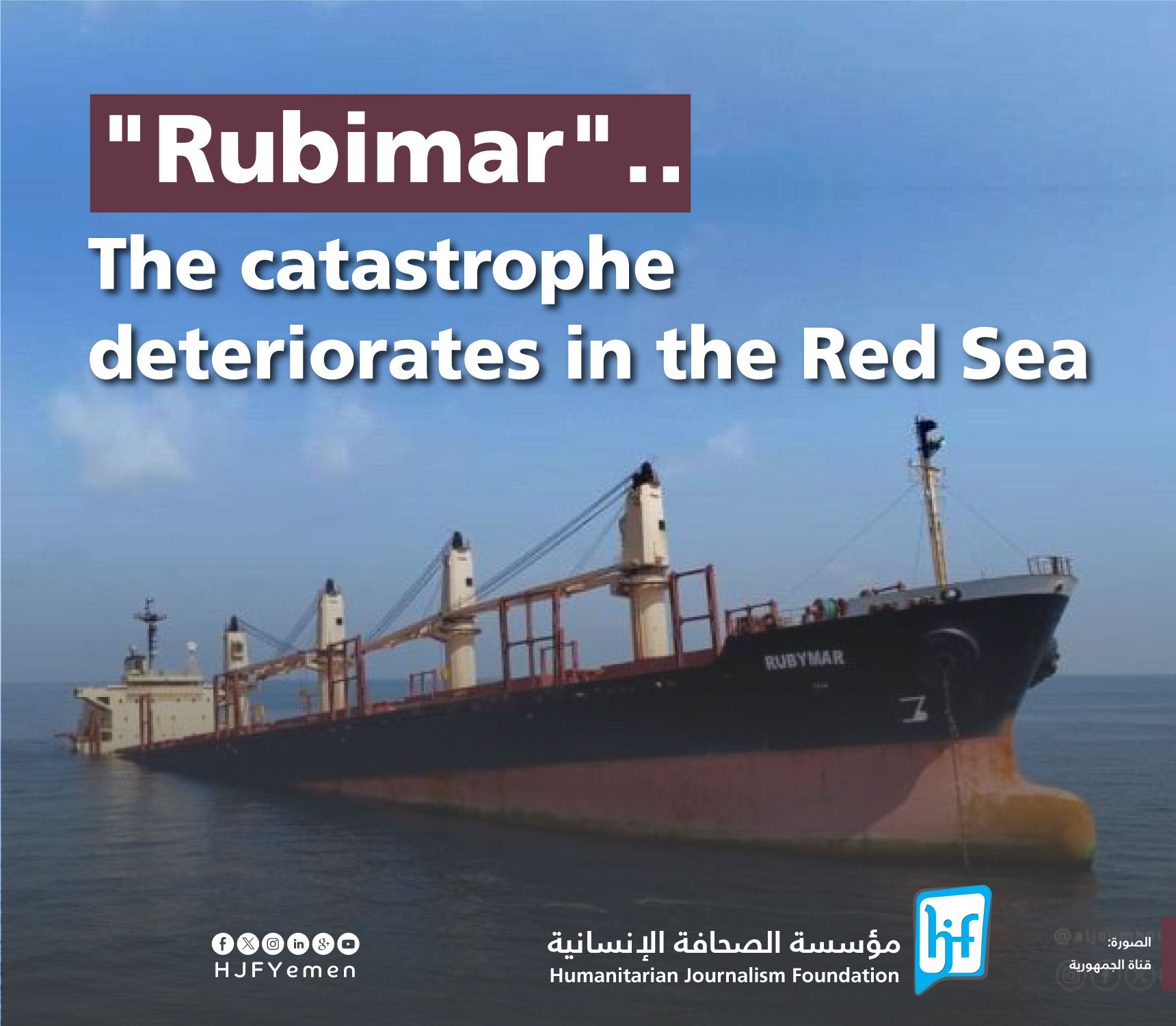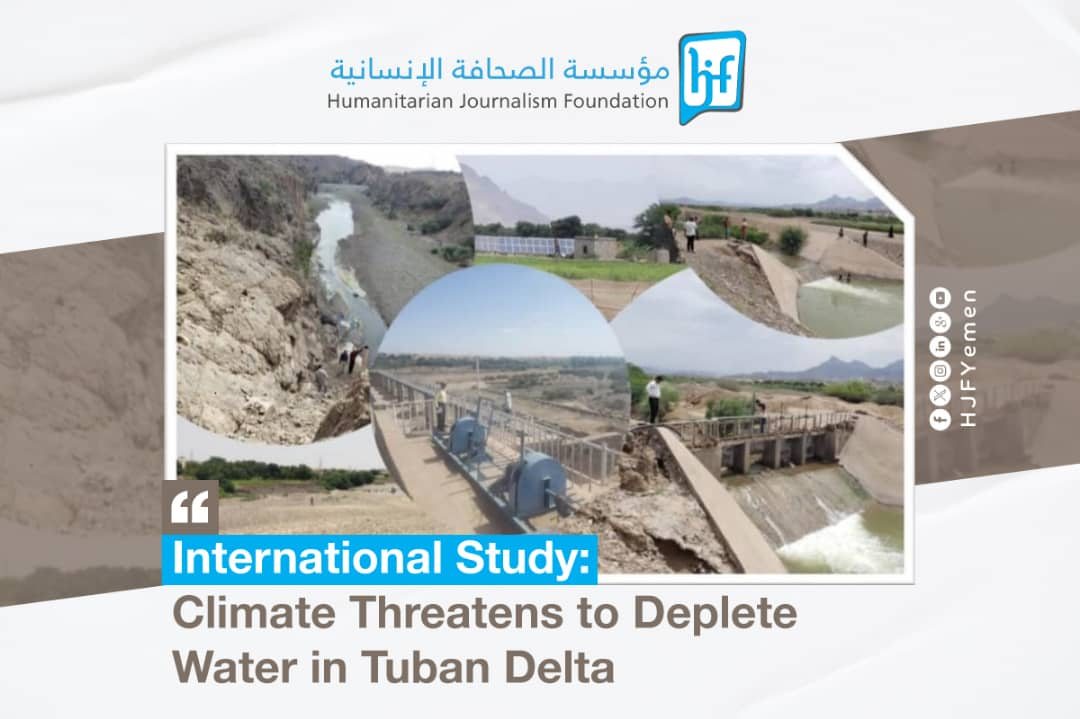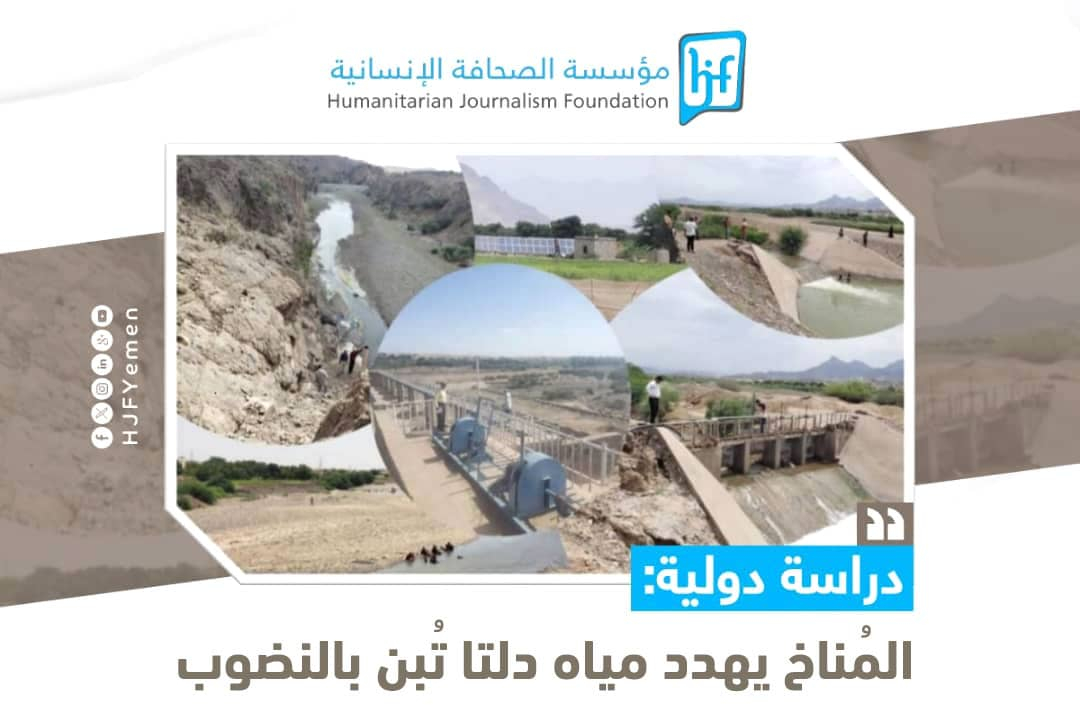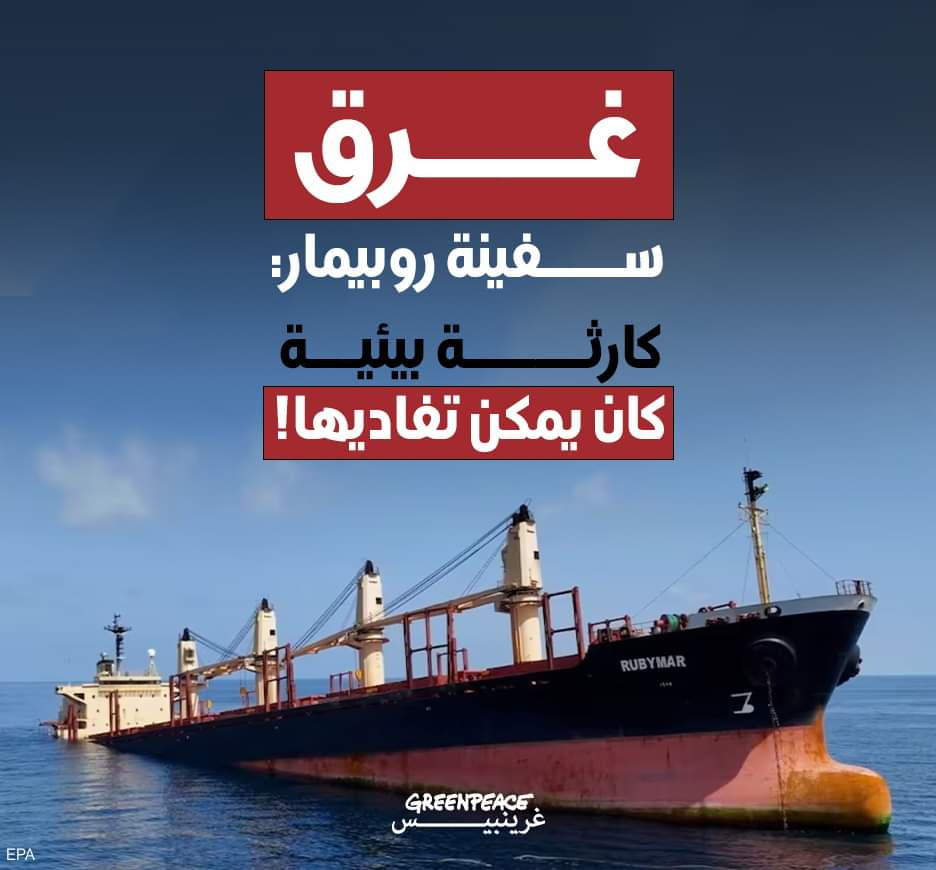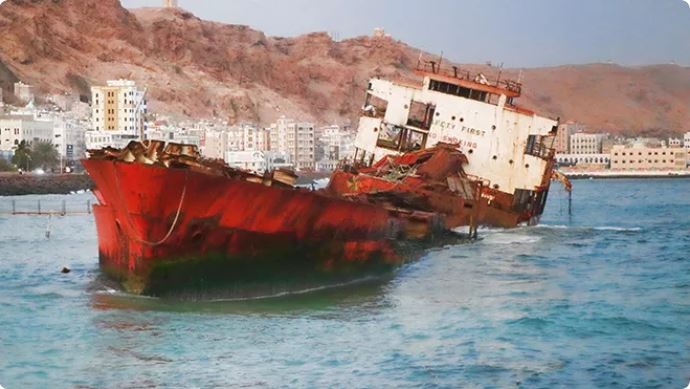Rubimar.. The catastrophe deteriorates in the Red Sea
2024-03-05
Humanitarian Journalism Foundation (HJF) - Bassam Al-Qadhi
Official reports indicate that the efforts to contain the leakage of fertilizers into the Red Sea following the sinking of the "Rubimar" ship near Hanish Island, as a result of being attacked by the Houthi group - designated as a terrorist organization by the United States - in mid-February, present a considerable challenge to the official entities within the internationally recognized legitimate government.
The environmental catastrophe triggered by the sinking of the "Rubimar" ship extends beyond Yemen's borders, impacting the nations along the Red Sea coastline as well.
The "Rubimar" ship, loaded with a hazardous cargo of IMDG 5.1 (Ammonium Phosphate-Sulfate NPS) estimated at 22,000 tons, is highly soluble upon contact with water. Given its high toxicity, its sinking constitutes a major disaster for the spill site, with the potential for widespread contamination and the flow of fertilizer into the sea, which could lead to extensive pollution reaching the shores. Additionally, it poses a threat to fish stocks, jeopardizing national resources and harming the national economy, as well as potentially causing severe losses to the fishing sector.
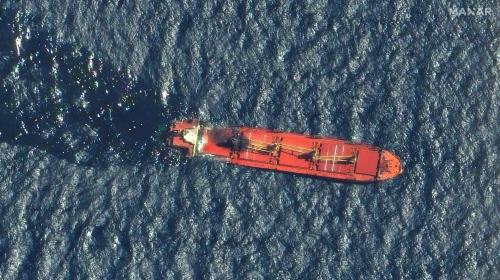
Reports prepared by a field team of experts from the Environmental Protection Authority (the report's author obtained copies) have affirmed that addressing the disaster requires urgent intervention from the United Nations, as Yemen lacks the capacity to handle such severe maritime disasters.
Based on the identical official reports, resolving the crisis resulting from the "Rubimar" sinking in the Red Sea necessitates the involvement of a proficient, well-trained, and seasoned international rescue team. This team would be tasked with devising strategies for managing the ship and selecting optimal solutions to alleviate the environmental and maritime repercussions endangering Yemen.
The Minister of Water and Environment, Engineer Tawfiq Al-Sharjabi, reiterated the urgency of the current situation regarding the sunken ship, calling on all international entities to urgently intervene to assist in finding solutions to salvage the "Rubimar" and the Yemeni environment from an environmental disaster. This call was made during an extensive meeting held yesterday via video conferencing technology, attended by representatives from the United Nations Development Programme, the United Nations Environment Programme, the International Maritime Organization (IMO), the Hurghada Environmental Emergency Center (Amrejesa), as well as numerous representatives from international organizations and experts in the field of sunken ships and combating oil spills at the sea.
Appeals to the United Nations to intervene
In a joint statement, Yemeni civil society organizations appealed to the United Nations and its international envoy, Hans Grundberg, as well as all international organizations concerned with climate, environment, and the international community as a whole, to urgently intervene decisively to save Yemen from a serious maritime disaster threatening the lives of millions of Yemenis on the coasts of the Red Sea and the Gulf of Aden. This appeal comes after the announcement by the legitimate government yesterday, Saturday, of the sinking of the "Rubimar" ship, two weeks after it was targeted by the Houthi group, classified as a terrorist organization by the United States.
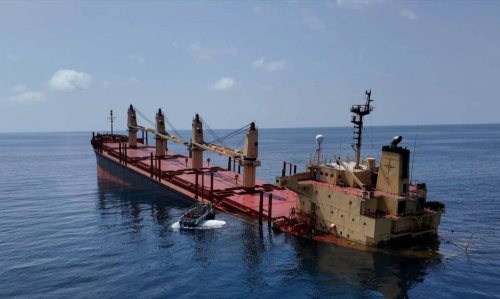
Following the targeting of the "Rubimar" ship, an oil slick spanning over 18 nautical miles was observed. The leakage of oil and other pollutants after its sinking would have devastating effects on all marine ecosystems and natural habitats in the Red Sea, leading to the destruction of coral reefs, which are one of the world's most important global resources. These reefs stretch along 4,000 kilometers of the Red Sea coastline and around the surrounding islands, and they remain flourishing. According to the same statement.
The sinking of the "Rubimar" is seen as an imminent threat jeopardizing the livelihoods of hundreds of thousands of Yemeni fishermen, due to the hazardous materials it contains, such as Ammonium Phosphate-Sulfate NPS (IMDG 5.1), estimated at 22,000 tons. These materials pose a significant danger as they quickly dissolve upon contact with water, given their high toxicity.
It was further explained that the sinking of the "Rubimar," loaded with tens of thousands of tons of hazardous fertilizers, will increase the risks of widespread pollution, with potential effects reaching inland. This poses a threat to national resources and the national economy by destroying coastal ecosystems, including the fishing sector, coral reefs, mangroves, and marine life in the region.
Yemeni organizations emphasized in their statement issued yesterday, March 3, 2024, that the disaster could jeopardize the humanitarian, water, and food security of millions of Yemenis amid the worst global humanitarian crisis in years. This underscores the immediate requirement for international and UN involvement to mitigate the anticipated consequences of the disaster, which may transform Yemen's coastlines into barren deserts.
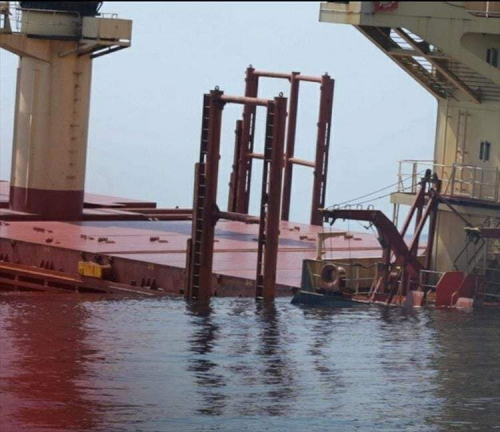
"Rubimar" exacerbates the humanitarian situation.
Dr. Abdulqader Al-Kharaz, Professor of Environmental Impact Assessment at the University of Hodeidah, stated that the risks of leakage of fertilizers and hazardous chemicals from the "Rubimar" ship are catastrophic. He emphasized that its effects will not be confined to coastal communities alone but will extend to all communities within Yemen, especially those consuming various marine organisms. Some of these organisms will carry these toxins, posing a significant risk to society as a whole.
Dr. Al-Kharaz stated that the ship has surpassed its operational lifespan, being over 25 years old, and is thus nearing its expected lifespan limit of 30 years. As a cargo vessel, it transports hazardous fertilizers and oil-based materials, which goes against its intended purpose.
Al-Kharaz, who previously served as the head of the Environmental Protection Authority in Yemen, explained that the ship's cargo capacity is 41,000 tons. Of this, 20,000 tons were reported to be hazardous chemical fertilizers, but the Crisis Cell reports did not specify the nature of the remaining half of the ship's cargo.
He emphasized that the ship is designed for transporting goods like grains, so how was it loaded with hazardous chemicals, which are also considered loose, meaning not packed in bags? This underscores that there are understandings between the Houthi militia and international syndicates for burying hazardous waste through what they dub "striking passing ships."
Al-Kharaz also mentioned that the company affiliated with the sunken ship "Rubimar" is based in Beirut, Lebanon, recalling the explosion at the Beirut port caused by chemical fertilizers. He further asserted that the game is about burying hazardous waste, questioning how the Houthi militias obtain such information and what repercussions await them for their involvement in sinking ships loaded with hazardous waste.
In addition, an unnamed local official from the Maritime Affairs Authority in Aden, who was part of the government team tasked with the on-site assessment of the current situation of the sunken "Rubimar," confirmed that the ship had indeed sunk on the first of March and its condition is extremely challenging. He also mentioned that its diameter could pose unforeseen risks, with high catastrophic dangers involved.
The sunken ship "Rubimar" was targeted on the evening of Monday, February 19th, by two Houthi missiles. Its current location is approximately 35 nautical miles from the port of Mokha in the Red Sea. Due to severe north winds, it drifted about 7 nautical miles northward from its original position during the past week.
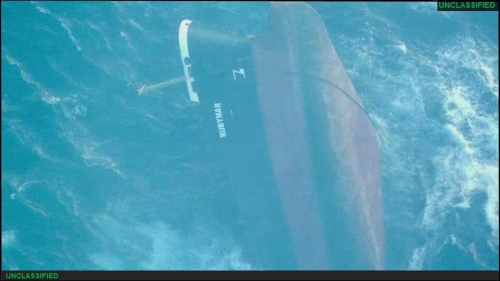
The disaster worsens while everyone ignores it
Earlier, the Ministry of Water and Environment in the internationally recognized legitimate government stated that "Rubimar" had sunk, posing a significant threat to the marine environment. They further mentioned that they have been and are currently reaching out to relevant international authorities to request assistance and response in addressing this anticipated disaster..
"Efforts are still underway with organizations to conduct a rapid assessment of the situation and address it, especially with the United Nations Environment Programme and the Regional Organization for the Conservation of the Red Sea and Gulf of Aden," according to Minister Al-Sharjabi. However, no significant action has been observed on the ground."
Despite the confirmation by the internationally recognized legitimate government yesterday regarding the sinking of "Rubimar" and the two weeks since it was targeted by a Houthi missile, there has been no concrete action taken on the ground to prevent the disaster. This includes no intervention from the United Nations, the UN envoy, or even the Crisis Cell to address the sunken ship, aside from issuing warnings through the media.
The “Crisis Cell” established by the legitimate government to address the "Rubimar" disaster has fallen short in carrying out its responsibilities effectively, displaying notable deficiencies. Both the Environmental Protection Authority and theMaritime Affairs Authority have only issued theoretical reports without implementing any practical actions. Furthermore, during their field visits, they failed to pinpoint the location of the contaminated area. What is its size? What are the materials composing it?
The field team formed by the Crisis Cell also failed, during their assessment of "Rubimar," to take samples from the polluted spot, hazardous fertilizers, or other oil-based materials from the ship's cargo. They did not identify their nature or take samples from marine organisms living near the ship to examine them and determine the type of toxins leaked into the sea and their effects on marine life. Moreover, they did not make any effective or prompt action on the ground or apply any significant pressure.
Similarly, the international community and the United Nations programs in Yemen, within two weeks of the disaster, have shown no concrete response, despite the severity of the situation, raising many questions.
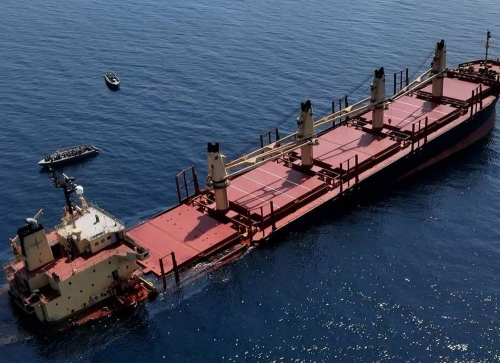
The economic and social impacts.
At a time when Yemen is grappling with severe economic crises due to the Houthi coup, the unemployment rate in Yemen has risen to 65%, with poverty exceeding 80%. The chemical and oil pollution from the "Rubimar" ship exacerbates an already dire situation.
The leakage of fertilizers and hazardous chemicals affects over 78,000 fishermen in Yemen's Tihama region, impacting the livelihoods of the residents, as fishing is their primary occupation.
According to environmental protection experts, it is difficult to predict how many years it will take for things to return to normal and the amount of resources required to rehabilitate the marine environment.
The coastal regions heavily depend on the fishing industry as a crucial food source. Communities relying on local fishing and aquaculture will bear significant consequences in the face of pollution, experiencing hardships when they can no longer fish for sustenance and livelihood.
The pollution along the coast and in the sea of the Tihama region results in the displacement of residents and social fragmentation as people lose their livelihoods and resources tied to the ocean. Moreover, oil spills have a considerable impact on the economy of the urban areas neighboring the spill location.
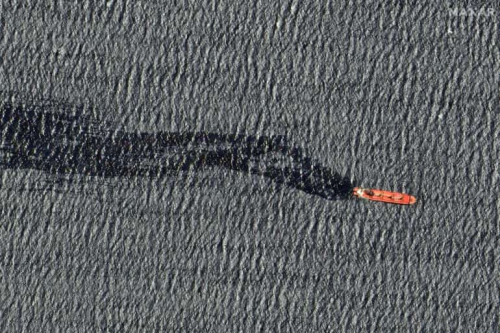
The impact on desalination water and wetlands.
The oil spills and leakage of fertilizers and hazardous materials from the "Rubimar" ship lead to a change in the quality of seawater, which will have a significant destructive impact on the desalination industry. This industry is emerging in those areas, threatening water supplies for the population and exacerbating social conflicts over water resources.
Moreover, the extent of maritime pollution may lead to the disappearance of most coastal wetlands, which could become desiccated due to this chemical contamination. Consequently, this will impact the biodiversity of wetlands and contaminate coastal drinking water reserves.
The challenge of pollution stemming from fertilizers, oil spills, and their remnants presents a significant obstacle for desalination plant plants, particularly in locations like Mokha and Bab al-Mandab. This arises from the potential threat it poses to the purity of the generated drinking water, thereby risking potential poisoning for individuals.
Targeting ships also undermines the Yemeni economy and disrupts food supplies to Yemeni ports, further exacerbating poverty rates. Pollution from fertilizers and oil can cripple various forms of commercial activity, negatively impacting the region's economy. Additionally, pollution from fertilizers and oil spills will have a detrimental effect on the aesthetic aspects of the beaches.
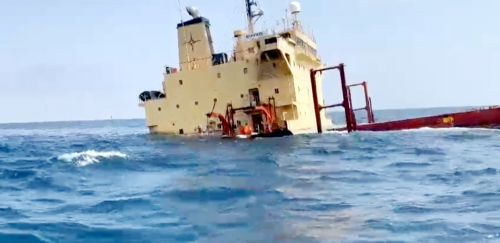
The risks of chemical fertilizer leakage
Reports from environmental protection experts and specialists in marine environment indicate that the fertilizers carried by the "Rubimar" ship are highly hazardous materials and goods. They are considered toxic and flammable chemicals, according to the cargo's manifest.
As per the governmental environmental protection agency, the leakage of dangerous chemical fertilizers poses a significant threat to the marine environment in Yemen, potentially leading to extensive damage. Moreover, if left unattended without swift and direct intervention, potential oil spills could also cause widespread devastation.
Chemical pollution incidents and oil spills into the sea lead to a significant decrease in both the quantity and quality of marine resources, which play a crucial role in human nutrition. Additionally, they contribute to a decline in the productivity of fish catches.
Additionally, chemical contamination results in extensive mortality among surface fish, caused by poisoning from dissolved fertilizers and dense crude oil. The eggs and larvae of numerous fish species that either float on the sea's surface or inhabit its upper layers are vulnerable to pollution and will experience considerable mortality rates.
Marine life is at risk
Marine animals directly or indirectly feed on the floating debris, and the presence of high concentrations of fertilizers in the water will increase their quantities. As a result, oxygen concentrations decrease, leading to suffocation and mortality of fish.
In addition, bivalves such as oysters suffer from massive mortality during oil spills reaching the coastal area. Extremely high concentrations of oil significantly affect their reproductive process, and thus, the toxicity of fertilizers contributes to the demise of bivalves.
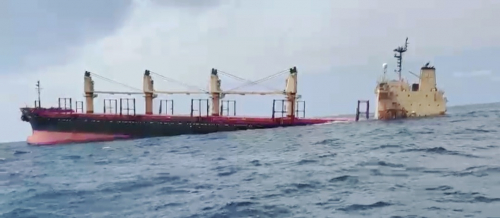
Birds are also among the most affected marine groups by oil pollution and other types of pollution. As usual, this will lead to the extinction of many species.
The formation of oil slicks can lead to the mortality of marine life, particularly impacting air-breathing creatures like snakes, turtles, and dolphins. Many of these animals have been seen migrating to the shore where they eventually perish due to respiratory issues, skin irritations, and internal bleeding. Should fertilizer levels rise, the situation will worsen.
Furthermore, small marine animals, particularly sea turtles, may mistakenly ingest spilled oil, thinking it is food, which can be highly detrimental or even fatal. It is also speculated that oil spills will harm birds, sea turtles, dolphins, and whales.
Widespread International Condemnation
Britain and the United States condemned last week the Houthi targeting of the 'Rubimar' ship, which has now become a serious threat to the Yemeni marine environment and the Red Sea countries.
The Houthi attacks on commercial ships in the Red Sea have sparked widespread international condemnation, notably through United Nations Security Council Resolution 2722, adopted on January 10, 2024. The resolution, supported by the majority of member states, calls on the Houthis to cease their attacks on passing cargo ships in the Red Sea.
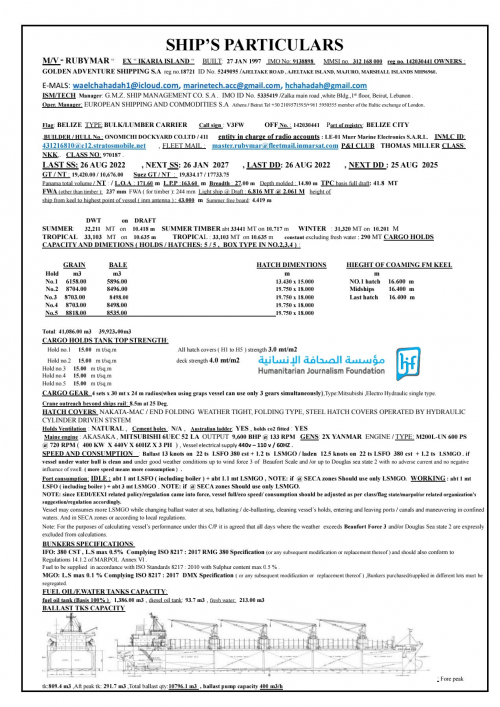
Previously, members of the United Nations Security Council vehemently denounced recent assaults by the Houthis on merchant ships in the Red Sea, posing a threat to global maritime traffic. Nevertheless, the United Nations and the Security Council have not formally classified the Houthis as a terrorist organization, despite the severity of their offenses.
Last week, the US Central Command warned of an escalating environmental disaster due to the leakage of water into the cargo ship "Rubimar," which was carrying over 41,000 tons of combustible fertilizers when it was attacked by Houthi rebels. However, there has been no action taken on the ground.
The Houthis targeted 54 ships
Last Thursday, Abdul-Malik al-Houthi, the leader of the Houthis, stated that his group, through what he termed "operations supporting the Palestinian people in Gaza," targeted 54 ships in the Red Sea, calling it "an important and significant number," according to the Russian news agency Sputnik.
On January 12th of the previous year, the United States and Britain initiated a comprehensive assault on Houthi faction locations across various Yemeni cities in retaliation for their assaults in the Red Sea and the Arabian Gulf.
Earlier, the Blue Fleet Group, the operator of the ship, stated that its crew had been evacuated to Djibouti after a missile struck the side of the vessel, causing water to leak into the engine room and the stern to bend. According to Roy Khouri, the CEO of Blue Fleet, speaking to Agence France-Presse, a second missile hit the surface of the ship without causing significant damage.
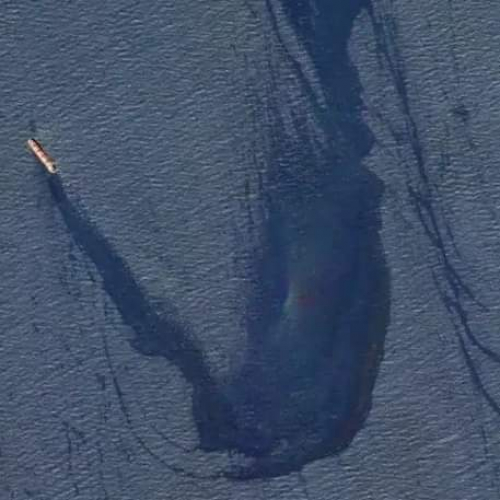
The attack on "Rubimar," according to Mont Carlo, caused the most significant damage to a commercial vessel since the Houthis began targeting ships in the Red Sea and the Arabian Gulf on November 19th last year. They claim these attacks are linked to Israel or heading to its ports, in solidarity with Palestinians in Gaza.
The attacks conducted by the Houthis have led certain shipping firms to circumvent the Red Sea route, constituting 12% of global maritime commerce, in favor of navigating around southern Africa.
Important recommendations for everyone
The investigator recommends that the United Nations support the implementation of UN Security Council Resolution 2722, which condemns Houthi attacks on ships in the Red Sea and calls for urgent intervention to prevent an environmental disaster resulting from the sinking of the ship. Additionally, the investigator suggests categorizing the Houthi militia as a terrorist group by the United Nations and the Security Council.
The Yemeni government also recommends collaborating with the United Nations and other relevant parties to protect the marine environment. The government should also rely on Yemeni expertise, professionalism, and nationalism to address this disaster.
The investigator recommends that the Houthis cease their attacks on civilian and commercial ships in the Red Sea, abide by international law, respect maritime rights and freedoms. Furthermore, they should respect Yemenis' right to preserve their health and marine natural resources, refraining from intentionally harming the people, as they have already suffered enough.
The investigator recommends that the international community closely collaborate with the internationally recognized Yemeni government and other relevant parties to assess the situation and provide immediate technical and financial assistance. Additionally, decisive intervention is necessary to rescue Yemen from a serious maritime disaster posed by the sinking of the "Rubimar" ship.
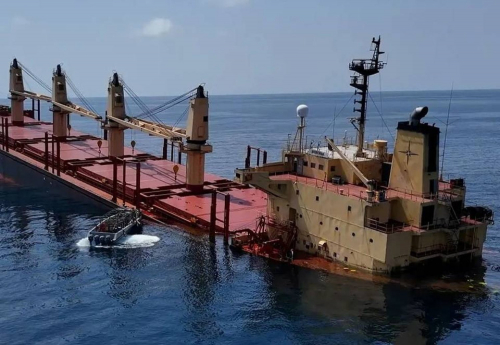
The sunken ship "Rubimar" is owned by Britain and operated by a Lebanese company. It sailed from the port of Al-Khair on the Arabian Sea in Saudi Arabia and stopped at the port of Khorfakkan in the United Arab Emirates to refuel and receive other services before being attacked by Houthi rebels on the evening of Monday, February 19th of last year.
Bassam Al-Qadhi
A specialized scientific journalist covering climate, environment, and health issues.
Translated by: Amira Yehia
This investigation was produced with the support and supervision of the Humanitarian Journalism Foundation (HJF) as part of the #Yemen_Climate_Emergency campaign.
